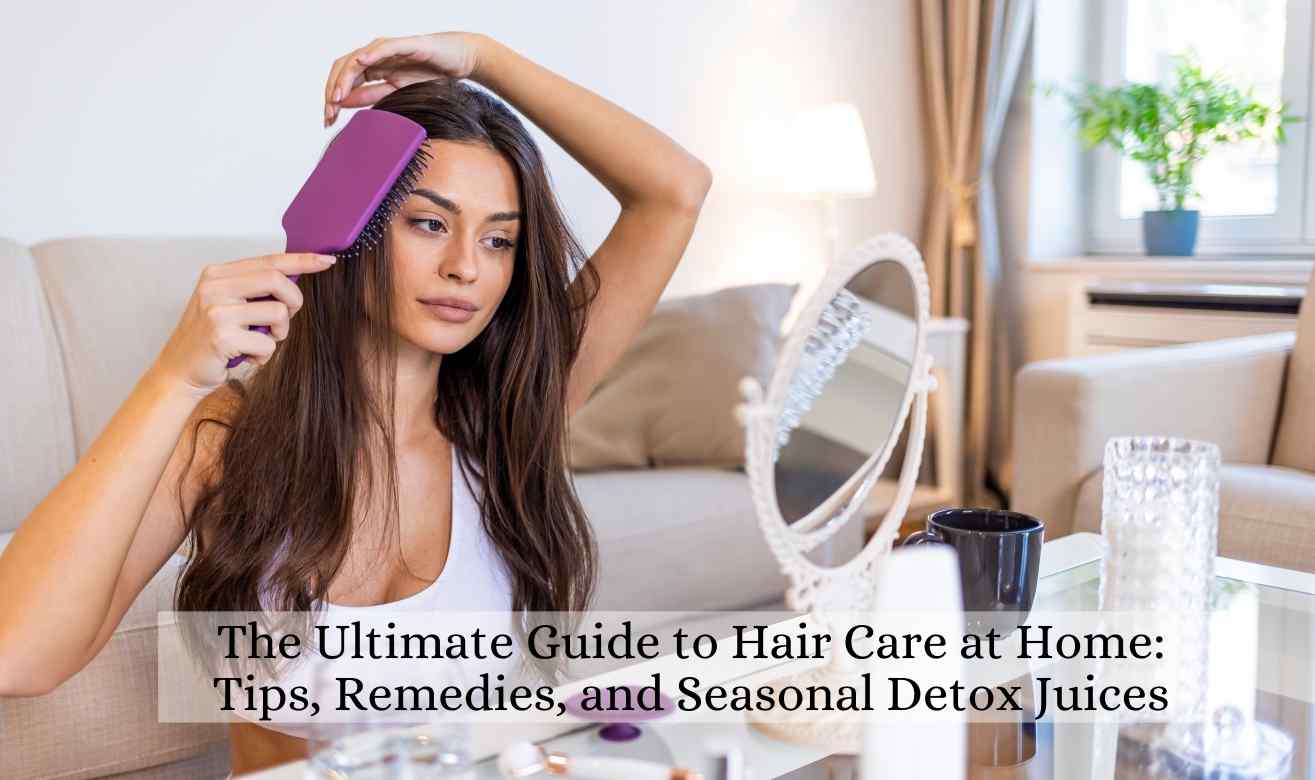10 Hair Care Tips at Home: Your Ultimate Guide to Healthy Hair
Introduction
Hair is often considered one of the most important aspects of personal appearance, and it’s no surprise that we all want it to look its best. Healthy, shiny, and voluminous hair can greatly enhance your overall look, boosting your confidence and self-esteem. Fortunately, achieving gorgeous hair doesn’t require expensive salon treatments or salon-grade products. With the right knowledge and a few simple techniques, you can achieve beautiful, vibrant hair at home.
In this article, we will explore 10 hair care tips at home that you can easily incorporate into your daily routine. These tips are designed to nurture and protect your hair, promoting healthy growth, minimizing damage, and enhancing the overall texture of your hair. Whether you have dry, oily, curly, straight, or wavy hair, these hair care tips at home are versatile and suitable for every hair type.
So, let’s dive into the world of natural, cost-effective hair care!
Why Should You Use Natural Ingredients for Hair Care at Home?
Many people overlook the power of natural ingredients, instead opting for chemical-laden products. But using natural substances to care for your hair is one of the most effective hair care tips at home you can follow. Natural ingredients are rich in vital nutrients that nourish the hair and scalp without causing irritation or damage.
Benefits of Using Natural Ingredients:
- Chemical-free: Many store-bought hair products contain harmful chemicals like sulfates, parabens, and silicones. These chemicals can strip the hair of its natural oils and lead to dryness or scalp irritation.
- Nutrient-rich: Natural ingredients like coconut oil, honey, aloe vera, and avocado provide essential vitamins and minerals that promote healthy hair growth and keep hair strands strong and shiny.
- Gentle on hair: Natural products are less likely to cause allergic reactions or leave harmful residues in the hair, making them a great option for individuals with sensitive skin or scalp conditions.
Some of the most beneficial natural ingredients for hair care include:
- Coconut oil: Known for its ability to penetrate the hair shaft, coconut oil helps to nourish and hydrate dry hair, preventing breakage and split ends.
- Aloe vera: A natural moisturizer, aloe vera can calm an irritated scalp and promote healthy hair growth.
- Honey: An excellent humectant, honey draws moisture into the hair and helps to repair damaged strands.
- Olive oil: Rich in antioxidants, olive oil nourishes and softens the hair while preventing hair loss.
By using these natural ingredients in your hair care tips at home, you can maintain your hair’s health and shine while avoiding the harmful effects of synthetic chemicals.
How Often Should You Wash Your Hair at Home?
One of the most common questions people ask is how often they should wash their hair. Over-washing your hair can strip it of its natural oils, leading to dryness and breakage. On the other hand, under-washing can result in an oily scalp and buildup of dirt and product residues.
The frequency of washing largely depends on your hair type and lifestyle. However, one of the key hair care tips at home is to aim for washing your hair 2-3 times a week. This is often enough to maintain a clean scalp while preserving natural oils.
Washing Frequency Recommendations:
- For oily hair: If you have an oily scalp, you may need to wash your hair more frequently, about 3 times a week. Make sure to use a gentle shampoo that does not strip your hair of moisture.
- For dry hair: If your hair is dry, washing it once or twice a week should suffice. You can also use a mild, moisturizing shampoo that helps replenish lost hydration.
- For normal hair: People with normal hair (neither too oily nor too dry) can wash their hair 2-3 times a week for optimal results.
It’s also important to avoid using hot water when washing your hair. Hot water can cause the cuticle layer of the hair to lift, leading to frizz and damage. Instead, opt for lukewarm water to help maintain your hair’s moisture balance.
How Can You Deep Condition Your Hair at Home?
Deep conditioning is a vital part of a healthy hair care routine. One of the most effective hair care tips at home is to incorporate a deep conditioning treatment into your weekly routine. Deep conditioning helps restore moisture, repair damaged hair, and improve hair texture.
Benefits of Deep Conditioning:
- Moisturizes dry hair: Deep conditioners provide intense hydration to dry and brittle hair.
- Repairs damage: Regular deep conditioning treatments help repair split ends, reduce frizz, and improve overall hair health.
- Increases shine: By moisturizing and smoothing the hair cuticle, deep conditioning helps add shine and luster to dull hair.
Here are a few DIY deep conditioning treatments you can try at home:
- Coconut oil and honey mask: Mix coconut oil and honey in equal parts. Apply the mixture to your hair and leave it on for about 30 minutes before rinsing. Coconut oil provides deep hydration, while honey locks in moisture.
- Avocado and olive oil treatment: Mash half an avocado and mix it with 2 tablespoons of olive oil. Apply this nourishing mask to your hair, focusing on the ends. Leave it for 30 minutes to an hour before washing.
How Can You Prevent Hair Breakage at Home?
Hair breakage is a common issue that affects many people, particularly those with long or curly hair. Fortunately, there are several hair care tips at home that can help prevent hair breakage and keep your hair healthy and strong.
Tips to Prevent Hair Breakage:
- Limit heat styling: Excessive use of styling tools like straighteners, curling irons, and blow dryers can cause hair to become weak and prone to breakage. When you do use heat tools, always apply a heat protectant spray beforehand.
- Avoid tight hairstyles: Tight ponytails, braids, and buns can cause tension on the hair shaft, leading to breakage. Opt for looser styles and use hair ties that don’t pull on the hair.
- Trim your hair regularly: Regular trims every 6-8 weeks help to remove split ends and prevent hair from becoming damaged and brittle.
- Use a wide-tooth comb: Wet hair is more fragile, so use a wide-tooth comb to gently detangle your hair after washing, rather than tugging at it with a fine-toothed comb or brush.
By following these tips, you can reduce the risk of hair breakage and keep your hair looking smooth and healthy. What Is the Importance of Scalp Care for Healthy Hair?
A healthy scalp is the foundation of healthy hair. Neglecting your scalp can lead to various issues like dandruff, dryness, and hair thinning. To ensure that your hair grows strong and healthy, one of the most important hair care tips at home is to take care of your scalp.
Scalp Care Tips:
- Scalp massages: Regularly massaging your scalp with your fingertips stimulates blood flow, which encourages hair growth and strengthens hair follicles.
- Clarifying treatments: Use a clarifying shampoo or a DIY scalp scrub to remove product buildup and unclog hair follicles.
- Use natural oils: Massaging oils like tea tree oil, peppermint oil, or argan oil into the scalp can help balance oil production, reduce irritation, and improve scalp health.
By maintaining a healthy scalp, you’ll create the ideal environment for your hair to grow long, strong, and shiny.
What Are the Best Homemade Hair Masks for Different Hair Types?
Hair masks are an excellent way to nourish and treat hair at home. Depending on your hair type, different ingredients can be used to address various hair concerns. Here are some of the best homemade hair masks for different types of hair:
For Dry Hair:
- Banana and honey mask: Blend one ripe banana with 2 tablespoons of honey. Apply the mask to damp hair and leave it for 20-30 minutes before rinsing. This mask helps hydrate and soften dry hair.
For Oily Hair:
- Lemon and egg mask: Mix the juice of half a lemon with one egg. Apply it to your scalp and hair. Lemon helps to balance oil production, while the egg strengthens the hair.
For Curly Hair:
- Avocado and coconut oil mask: Blend half an avocado with 2 tablespoons of coconut oil. This mask helps define curls while adding moisture and preventing frizz.
For Fine Hair:
- Egg and yogurt mask: Mix one egg with 2 tablespoons of plain yogurt. This mask strengthens fine hair and adds volume without weighing it down.
Using these homemade masks regularly can improve the health and appearance of your hair, making it stronger, shinier, and more manageable.
How Does Diet Affect Your Hair Health?
What you eat has a significant impact on your hair’s health. The right nutrients can promote hair growth, strengthen hair, and prevent issues like hair loss and thinning. Including certain foods in your diet can make a noticeable difference in the condition of your hair.
Hair-Boosting Foods:
- Salmon: Rich in omega-3 fatty acids, salmon nourishes the scalp and promotes healthy hair growth.
- Spinach: High in vitamins A and C, spinach helps produce sebum, the natural oil that keeps hair moisturized.
- Nuts and seeds: Packed with zinc, vitamin E, and biotin, nuts and seeds help maintain healthy hair growth.
- Eggs: A great source of protein and biotin, eggs strengthen hair and promote thicker growth.
Incorporating these foods into your diet can provide your hair with the essential nutrients it needs to thrive.
How Can You Protect Your Hair from Heat Damage?
Frequent use of heat styling tools like blow dryers, straighteners, and curling irons can cause significant damage to your hair. To minimize heat-related damage, follow these hair care tips at home:
Heat Protection Tips:
- Use a heat protectant: Always apply a heat protectant spray or serum before using any heat styling tool. This creates a barrier between your hair and the heat.
- Lower the heat settings: When using styling tools, try to keep the heat setting as low as possible. High heat can cause dryness and brittleness.
- Limit the frequency: Avoid using heat tools daily. Give your hair a break and embrace natural hairstyles to reduce the risk of heat damage.
By following these tips, you can keep your hair looking healthy and shiny while still enjoying your favorite styling tools.
Why Is Regular Trimming Important for Healthy Hair?
Regular trims are one of the simplest and most effective hair care tips at home. While trimming doesn’t make your hair grow faster, it helps to maintain its health, texture, and appearance by removing split ends and preventing further damage.
Benefits of Regular Trimming:
- Prevents split ends: Regular trims remove damaged ends, preventing split ends from traveling up the hair shaft and causing further breakage.
- Maintains shape: Trimming your hair every 6-8 weeks helps maintain your haircut’s shape and volume.
- Enhances hair growth: Although trimming doesn’t directly affect growth, it prevents breakage and helps your hair grow healthier over time.
Make sure to schedule regular trims to keep your hair in top condition.
What Are Some Easy Daily Hair Care Routines?
A good hair care tips at home routine doesn’t have to be time-consuming. By following a few simple steps daily, you can maintain the health and beauty of your hair.
Daily Hair Care Routine:
- Use a gentle shampoo and conditioner: Choose products suitable for your hair type and avoid harsh chemicals.
- Brush your hair gently: Use a soft-bristle brush to detangle your hair and avoid breakage.
- Protect your hair at night: Use a silk pillowcase or a satin hair wrap to reduce friction and prevent breakage during sleep.
By following a simple daily routine, you can keep your hair looking healthy and nourished without much effort.
Modern Designer Sarees for Women – Shop Now and Get Exclusive Discounts + Free Shipping
Conclusion
Achieving healthy, beautiful hair at home doesn’t require expensive salon treatments or fancy products. By following these 10 hair care tips at home, you can effectively nourish and protect your hair using simple, natural methods. From deep conditioning to protecting your hair from heat damage, these tips cover every aspect of hair care. Remember, consistency is key. With patience and the right routine, you can enjoy strong, shiny, and vibrant hair. Start incorporating these hair care tips at home into your daily routine and watch your hair transform into its healthiest state yet!
FAQs
1. How often should I wash my hair?
Ans. It depends on your hair type, but generally washing your hair 2-3 times a week is ideal to maintain moisture and prevent buildup.
2. Can I deep condition my hair every day?
Ans.No, deep conditioning is best done once a week to avoid over-moisturizing and weighing down your hair.
3. What foods are best for hair growth?
Ans.Foods rich in omega-3 fatty acids, vitamins A and C, biotin, and zinc, such as salmon, spinach, and eggs, promote healthy hair growth.
4. How can I prevent heat damage?
Ans.Use a heat protectant spray, lower the temperature on styling tools, and limit the use of heat tools to prevent damage.
5. Why is scalp care important?
Ans.A healthy scalp promotes healthy hair growth. Regular massages, cleansing, and moisturizing prevent issues like dandruff and hair thinning.
6. Does trimming your hair help it grow?
Ans.While trimming doesn’t make hair grow faster, it helps prevent split ends and breakage, allowing your hair to grow healthier.












